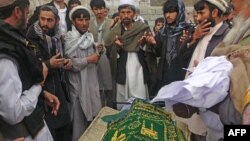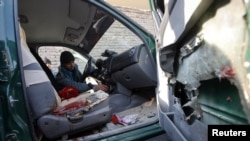ISLAMABAD —
Gunmen on Monday shot and killed an Afghan women's affairs official, just months after her predecessor was assassinated in a car bombing. As the United Nations marks Human Rights Day women still face challenges in Afghanistan.
Najia Sediqi was on her way to work in the capital of eastern Laghman province when she was gunned down Monday. The drive-by killing had all the hallmarks of a Taliban targeted attack.
Sediqi was the acting director of the provincial women's affairs department. She had stepped in to lead the office after the July assassination of Hanifa Safi, who was killed when a bomb attached to her car exploded.
A spokesman for the provincial governor's office, Sarhadi Zawak, said Sediqi had just left her home in Mehtarlam when she was attacked by gunmen on a motorbike.
The spokesman said that Sediqi's killing was part of an insurgent campaign of terror aimed at professional women.
He says, "Opponents always try to spread fear, and to show those women who work shoulder to shoulder with the government that they will face considerable challenges, and thereby force them to stop working."
According to Human Rights Watch, the situation for women's rights in Afghanistan is particularly bad. The New York-based rights group cites threats and attacks by insurgents on female leaders, school girls and women trying to escape domestic violence.
If the Afghan government is not able to secure the safety of women, says activist Rana Nooristani. "Then that will of course cause a lot of problems for the women, and that will really discourage women to do more or to work outside the home or to work outside, or be active in society, to play their role actively," she said.
The U.S. Embassy in Kabul condemned the attack and praised Sediqi for her unwavering dedication to women's rights.
Since the U.S.-led ouster of the Taliban in 2001, women and girls in Afghanistan have won back some basic rights, including being able to go to school and work outside the home. But some fear that these gains are fragile, and could be traded for peace with the Taliban after international forces leave in 2014.
Also Monday, a roadside bomb killed the police chief for the southwestern province of Nimroz.
The attacks following the wounding of Afghanistan's intelligence chief in an assassination attempt last week in Kabul.
Najia Sediqi was on her way to work in the capital of eastern Laghman province when she was gunned down Monday. The drive-by killing had all the hallmarks of a Taliban targeted attack.
Sediqi was the acting director of the provincial women's affairs department. She had stepped in to lead the office after the July assassination of Hanifa Safi, who was killed when a bomb attached to her car exploded.
A spokesman for the provincial governor's office, Sarhadi Zawak, said Sediqi had just left her home in Mehtarlam when she was attacked by gunmen on a motorbike.
The spokesman said that Sediqi's killing was part of an insurgent campaign of terror aimed at professional women.
He says, "Opponents always try to spread fear, and to show those women who work shoulder to shoulder with the government that they will face considerable challenges, and thereby force them to stop working."
According to Human Rights Watch, the situation for women's rights in Afghanistan is particularly bad. The New York-based rights group cites threats and attacks by insurgents on female leaders, school girls and women trying to escape domestic violence.
If the Afghan government is not able to secure the safety of women, says activist Rana Nooristani. "Then that will of course cause a lot of problems for the women, and that will really discourage women to do more or to work outside the home or to work outside, or be active in society, to play their role actively," she said.
The U.S. Embassy in Kabul condemned the attack and praised Sediqi for her unwavering dedication to women's rights.
Since the U.S.-led ouster of the Taliban in 2001, women and girls in Afghanistan have won back some basic rights, including being able to go to school and work outside the home. But some fear that these gains are fragile, and could be traded for peace with the Taliban after international forces leave in 2014.
Also Monday, a roadside bomb killed the police chief for the southwestern province of Nimroz.
The attacks following the wounding of Afghanistan's intelligence chief in an assassination attempt last week in Kabul.






